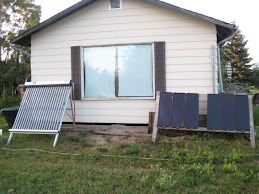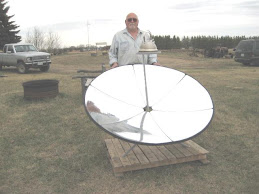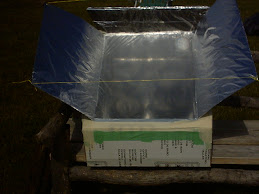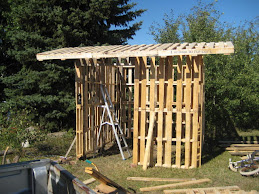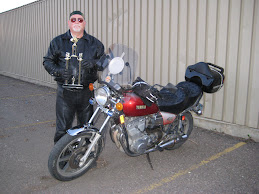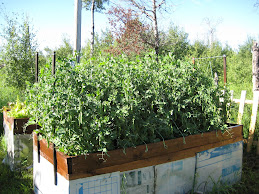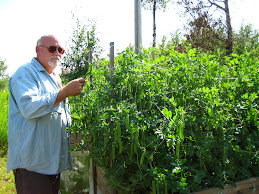On a personal note we have moved several steps closer to our goal of going off-grid, and each step has shown us that it is possible, and that we can make the adjustments that will make the possibility a reality. With some good planning and some diligence 2010 should be the year that we race for the main breaker and pull the plug on the power company.
But it is more then that. It is the whole process of discovering that we can get by on less, that we don't have to earn the mega income, that life can be simpler, and we can have more control over what we do, when we do it, and where our food comes from. Those are the composites that work together to make being self-reliant a realistic option.
The year 2009 has been a year of ups and downs. We have witnessed the near collapse of the US banking system, seen major companies hover on the brink, be forced to merge and have to fly to Washington and Ottawa for bail-outs. People have seen the value of their homes and pensions nearly wiped out. We have seen the weirdest weather, seen gas race up to $1.50 liter and then drop to 90 cents a liter, and watched as governments from around the world can not agree on anything.
Each of us will have to take out their own score card to see how you fared in 2009. Regardless of how that looks, we need to look long and hard at what is likely coming in 2010. Depending on where you live and what kind of work you do, even that can vary drastically.
Looking at the large picture, there will be continued recovery in the US and Canadian economy's, BUT almost every expert agrees that it will be a recovery that will not see much if any growth in the job market. The jobless rate will stay near record high, and wages will fail to keep pace with inflation.
Looking at the large picture, there will be continued recovery in the US and Canadian economy's, BUT almost every expert agrees that it will be a recovery that will not see much if any growth in the job market. The jobless rate will stay near record high, and wages will fail to keep pace with inflation.

As the recovery starts to take hold, we will see a increase in the price of gas, that coupled together with the lack of easy to get to and cheap gas will see the price of gas works its way up to the $2.00 liter area. At that price there will be people that will not be able to afford to drive, so they will end up parking their cars or defaulting on their car loans. Some have suggested that at that price for gas, upwards of 20% of car owners will abandon their cars. It will mean that the long commute will be getting less and less feasible.
Presently interest rates are at an all time low. Which has resulted in people over buying when they purchase a home. The Governor of the Bank of Canada has warned that interest rates will have to go up and that will see some people having to make much larger house payments then they are prepared for. Additionally He has stated that the biggest threat to the Canadian economy is the very high level of household debt. The debt level in the US is at or near the same level and holds the same threat for the US economy as it does it Canada.
Governments and individuals will not be able to spend their way to a recovery, despite what some “rose color glasses” wearing economists have suggested. To many people are to deep in debt for the “buy now pay late” to work. If interest rates go up even a little, the recovery could stall. I am afraid that the optimistic outlook, has overlooking the fact that discretionary spending dollars are at an all time low and about to get even lower.
What does all that mean for you and me? Well as a Cheap-O we already taking steps to pay down debt and to make sure that cars and homes are paid for or paid off as soon as possible, to eliminate the use of credit cards or at least see that they are paid off monthly. I have spent some time evaluating my work situation, and while my employment looks secure at this point, there are real reasons to look at self-employment, or the possibility of other work should things change. We have been working hard to reduce our cost of living to the point that if and when push comes to shove we can survive on one minimum wage job. That in its self helps a persons stress level stay in the safe range. We are also working on a back up plan and a back up plan for that. Call them plan B, plan C, D, E and so on.
We are making sure the pantry and freezer are full, working toward having a 6 month supply of food on hand. We are working hard to decrease the amount of driving we do by combining trips to town, coordinating with neighbors so that when someone does to town they can pick up thing for the rest of us and or the other way around, having supplies on hand so we don't have to just run to town for this or that.
We continue to find ways to reduce the ongoing monthly cost of living, we have cut back on some telephone calling features and got rid of the long distance plan this lowered our phone bill over $40 a month. We are working hard at getting the power bill way way down, the tale will be in February when we get our annualized billing, that will tell us how effective we have been, and let us know how much harder we have to work at trimming our power consumption.
More then anything we are ready for just about anything the Government or the market place can throw at us. Generations of our ancestors faced adversity that we can only imagine, they would think that we have it easy, and wonder why we are worried. But then, for some people it is a major disaster when the cell phone battery goes dead, I guess they might be right that we don't know anything about real hardship.
Governments and individuals will not be able to spend their way to a recovery, despite what some “rose color glasses” wearing economists have suggested. To many people are to deep in debt for the “buy now pay late” to work. If interest rates go up even a little, the recovery could stall. I am afraid that the optimistic outlook, has overlooking the fact that discretionary spending dollars are at an all time low and about to get even lower.
What does all that mean for you and me? Well as a Cheap-O we already taking steps to pay down debt and to make sure that cars and homes are paid for or paid off as soon as possible, to eliminate the use of credit cards or at least see that they are paid off monthly. I have spent some time evaluating my work situation, and while my employment looks secure at this point, there are real reasons to look at self-employment, or the possibility of other work should things change. We have been working hard to reduce our cost of living to the point that if and when push comes to shove we can survive on one minimum wage job. That in its self helps a persons stress level stay in the safe range. We are also working on a back up plan and a back up plan for that. Call them plan B, plan C, D, E and so on.
We are making sure the pantry and freezer are full, working toward having a 6 month supply of food on hand. We are working hard to decrease the amount of driving we do by combining trips to town, coordinating with neighbors so that when someone does to town they can pick up thing for the rest of us and or the other way around, having supplies on hand so we don't have to just run to town for this or that.
We continue to find ways to reduce the ongoing monthly cost of living, we have cut back on some telephone calling features and got rid of the long distance plan this lowered our phone bill over $40 a month. We are working hard at getting the power bill way way down, the tale will be in February when we get our annualized billing, that will tell us how effective we have been, and let us know how much harder we have to work at trimming our power consumption.
More then anything we are ready for just about anything the Government or the market place can throw at us. Generations of our ancestors faced adversity that we can only imagine, they would think that we have it easy, and wonder why we are worried. But then, for some people it is a major disaster when the cell phone battery goes dead, I guess they might be right that we don't know anything about real hardship.

We can all take a lesson from our parents, grandparents, and their parents, that every challenge presents an opportunity, and that like them we can get through. They dealt with world wars, the great depression, and things we have only read about. So this bit of a bump on the road should not give us that much trouble.
As we head into 2010 lets take the opportunity for each of us to get closer to our goals.
Cheap-O Economics



